- 47 units available
- 1 bed • 2 bed • 3 bed
- Amenities
In unit laundry, Hardwood floors, Dishwasher, 24hr maintenance, Stainless steel, Walk in closets + more

Wondering how to soundproof an apartment without drilling holes, upsetting your landlord, or failing an apartment inspection? In 2025, renters have more damage-free soundproofing solutions than ever, from rugs and curtains to mass-loaded vinyl and window inserts. Our guide answers your most common questions about blocking out noise in apartments with 12 proven, renter-friendly ways to reduce unwanted sound to create a quieter home.
Apartment noise is more than a nuisance, it’s also a health risk. Experts say that consistent exposure above roughly 70 dB(A), like busy city streets, can increase the risk of hearing damage and stress. The EPA recommends keeping noise below about 55 dB outdoors and 45 dB inside to avoid issues, including disrupted sleep and elevated blood pressure.
Beyond stopping noise from leaking in from outside, persistent neighbor and apartment complex noise can also cause stress and sleepless nights. Using this health info and 70 dB(A) stat could come in handy if you need to talk to your landlord about the necessity of soundproofing options.
| Soundproofing Option | Cost Level | Effort Level | Best For |
|---|---|---|---|
| Rugs & Pads | Low | Low | Impact noise, downstairs neighbors |
| Soundproof Curtains | Low-Medium | Medium | Airborne noise from outside |
| Window Inserts | Medium | Medium | Traffic, street noise |
| Bookshelves (fully stocked) | Low | Medium | Shared walls |
| Mass-Loaded Vinyl (MLV) | High | High | Serious noise issues, dedicated rooms |
| White Noise Machines/Apps | Low | Low | Masking noise, quick fixes |
The first step in soundproofing is figuring out exactly where the noise is coming from so you don’t waste time on the wrong fixes. There's probably no need to go about soundproofing an entire apartment from top to bottom if the real issue is your front door or a shared bedroom wall.
In order to come up with a productive solution, you have to first identify which areas of your apartment are responsible for troublesome noise and focus on those areas. Some common culprits include:
Before you choose a fix, it helps to know whether you’re dealing with airborne noise (voices, TV, traffic) or impact noise (footsteps, dropped objects). Airborne noise responds best to sealing windows, doors, or using curtains, while impact noise is better controlled with rugs, padding, or underlayment.
Yes! Although it’s not a perfect solution, heavy sound-proof blankets can be an affordable way to cut down on noise quickly. People in recording studios use soundproofing blankets, and they can work wonders in noise reduction for apartments, too. The noise-reducing material cuts noise considerably, especially when you pair this technique with other sound barriers for apartments.
The only caveat is that you need a friend or neighbor to come up with a permanent solution to make apartment walls soundproof since these blankets are heavy and not easy to install on your own.
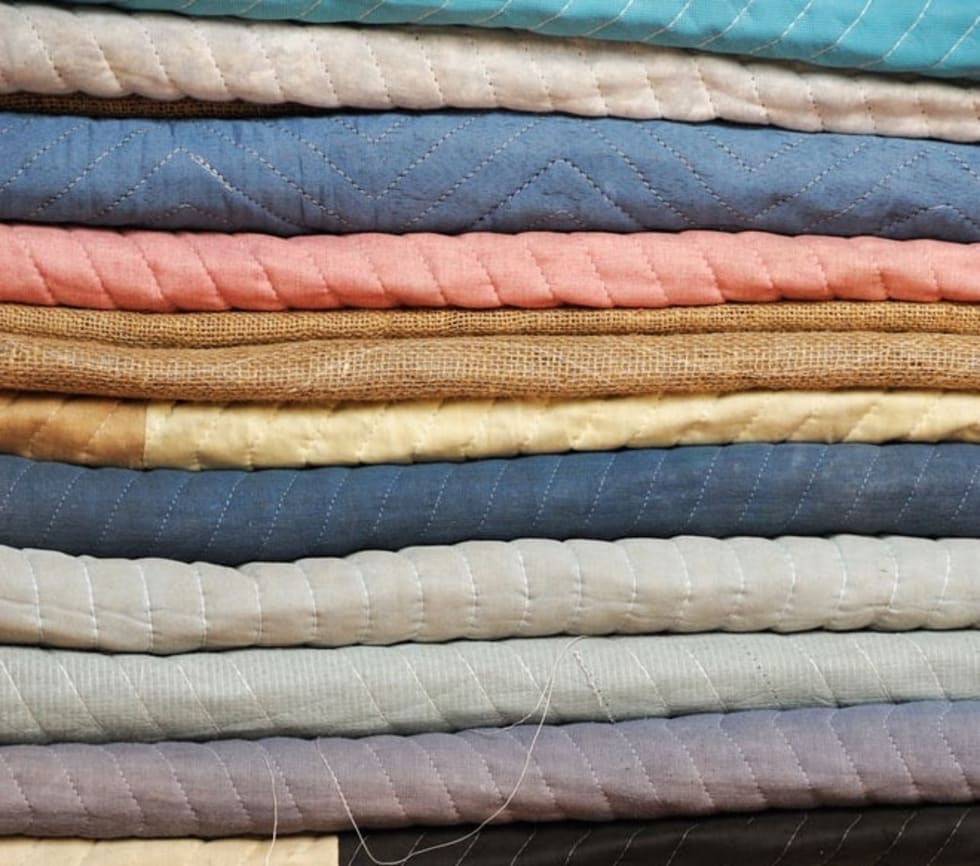
Soundproof curtains can help block the sound from your windows when it comes to soundproofing a rental apartment.
Choose your favorite patterns, then install them on your windows. They’ll help block out pesky pups, sanitation workers, and idling trucks that love to hang around your noisy apartment building while soundproofing apartment windows simultaneously.
These curtains are heavy, so you'll probably want to do a standard drill installation. We tell you how to do that easily using templates in this guide to hanging curtains!
For even more noise reduction, renters can also try removable window inserts in combination with their curtains. Acoustic grade inserts block approximately 70% of noise on single-pane windows (18.9 dBA reduction) and around 50% on double-pane (10–12 dBA), making a big difference on sound without the need for drilling.
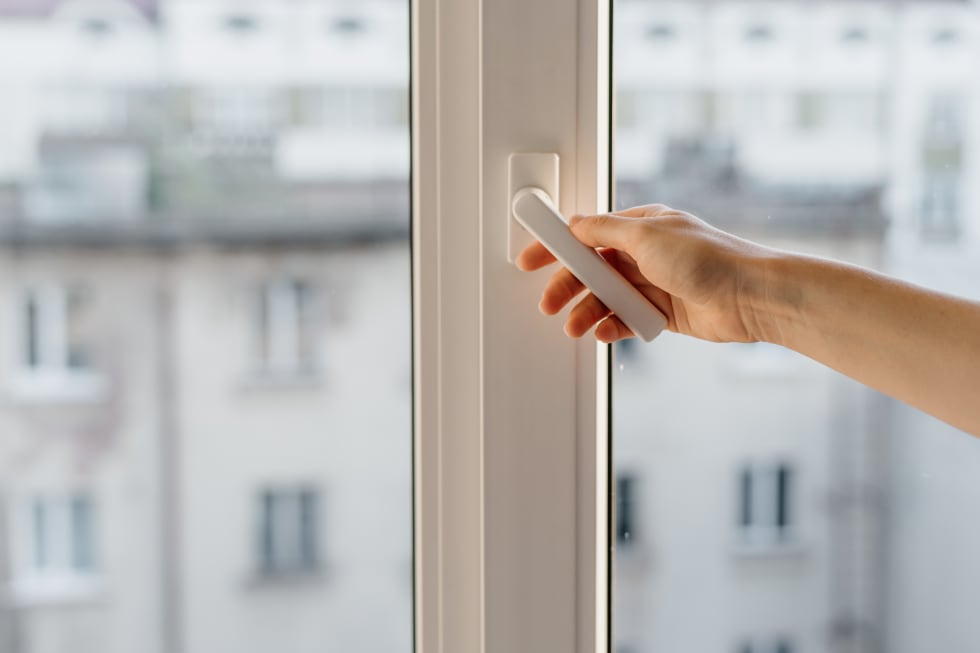
Even small gaps around doors and windows can let in a lot of sound, but sealing them is one of the easiest fixes and lowers your energy bills. Try an acoustic seal kit. You can also ask your landlord about weatherstripping your door and windows to eliminate gaps for apartment noise reduction.
Asking the landlord about upgrading a hollow-core door to a solid-core version or adding a removable door gasket can block significantly more noise. Even if that’s not allowed, renters can usually add door sweeps or compression seals that come off cleanly when it’s time to move.
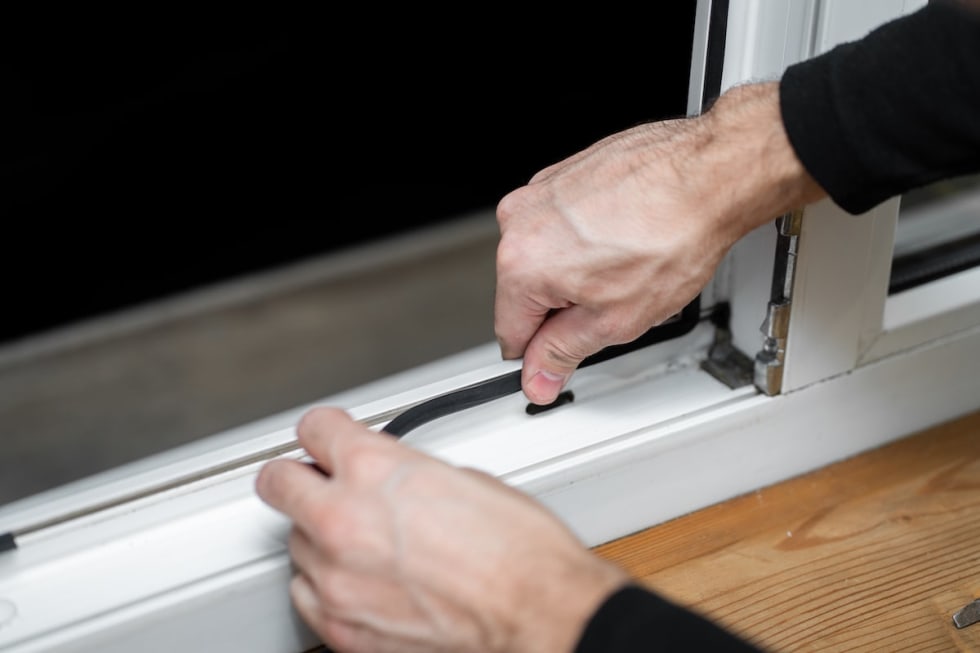
Adding bookshelves around problematic walls to help soundproof your apartment. Then, fill them with your favorite books, souvenirs, storage baskets, and plants. A tall, fully stocked bookshelf works especially well because mass and density create a stronger sound barrier between you and a noisy wall.
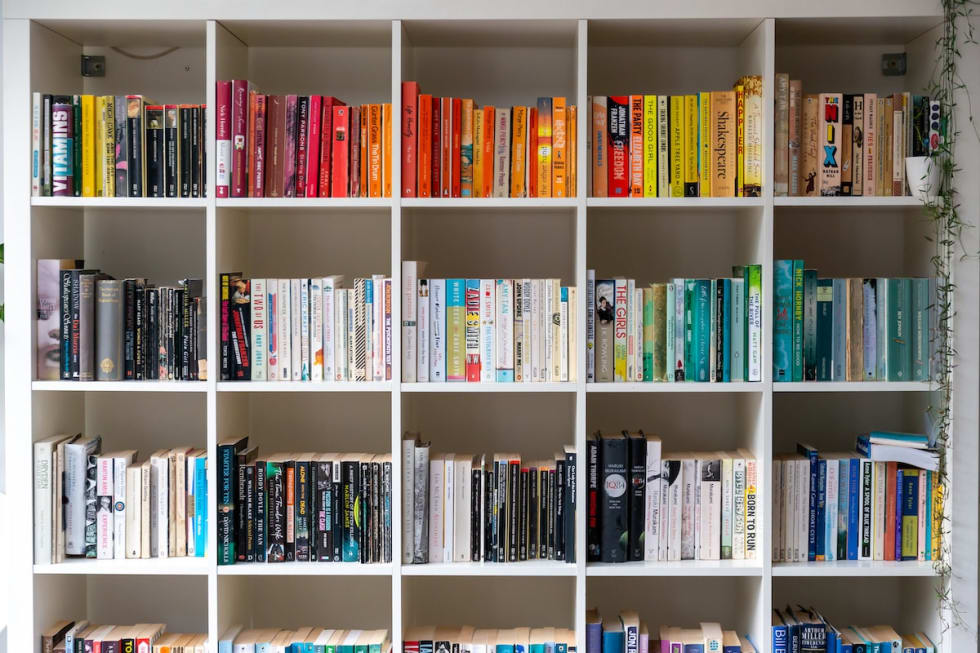
Rugs and padding don’t just cozy up your space; they also absorb impact sounds and reduce echoes. Hardwood floors may look fantastic, but they often carry sound and bother neighbors below. Decrease the sound bouncing around your apartment, and have a heart for your downstairs neighbors.
Add a pad and rug to absorb sound; it could make your apartment complex a little happier.
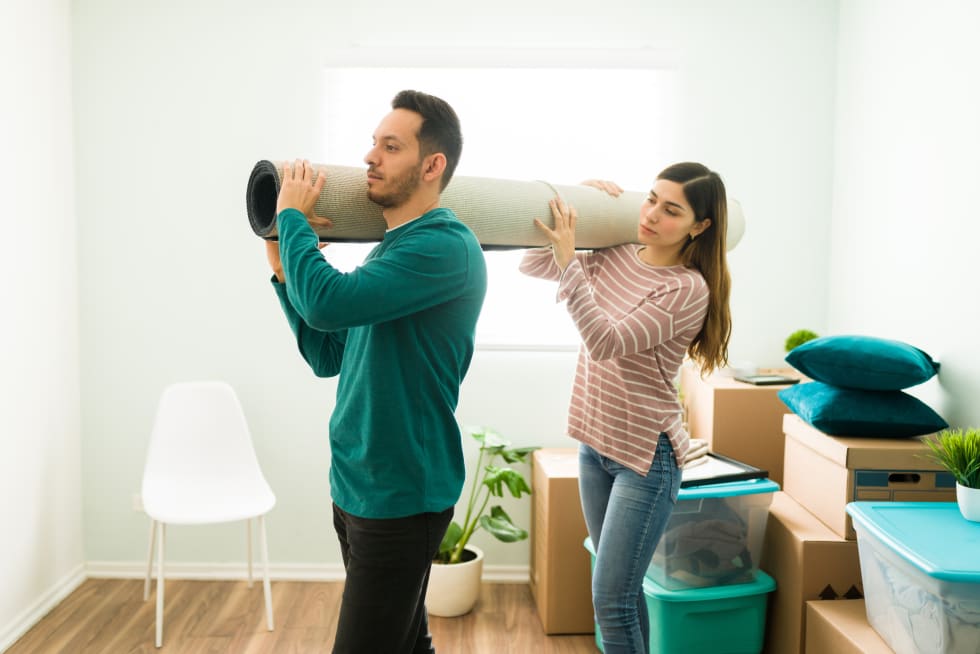
When blocking noise isn’t possible, masking it with a white noise machine or background sound can make a big difference. Choose your favorite songs and add a few sound machines or an app on your household devices to carry sound. Soft sounds can distract you from the more annoying sounds around you.
Sometimes the simplest solution is just having a kind conversation with your noisy neighbors. Go out of your way to smother your neighbors in kindness. Consider giving them some baked treats, a bottle of wine, and a nicely worded note if your apartment sound blockers are not working.

It may be time to call in your landlord if noise is a pervasive, disruptive issue in your apartment. The landlord may ask the neighbors to quiet down or devise ways to soundproof an apartment with different strategies like carpeting the apartment above you.
You can also look at your lease agreement for the “covenant of quiet enjoyment” clause. Although it’s somewhat vague and can be difficult to enforce, if you can prove your neighbors are excessively noisy, you can push the landlord to either relocate you to a different unit, deal with the neighbors, or let you out of your lease without penalty.
Sound-absorbing panels help reduce echoes inside your unit and can be used without damaging walls. These panels can be made from a variety of materials, such as fabric, foam, or wood. They work by absorbing sound waves and reducing echoes. Sometimes it is sufficient to prop them up against a wall, but other times, they may need to be professionally installed, so this might not be the best option for apartments. However, even a simple piece of wood can work as a make-shift sound absorbing panel, and it's worth a try if you've exhausted everything else.
Don’t forget about small sound leaks around outlets and switch plates. Adding inexpensive foam gaskets behind covers can help block these often-overlooked noise pathways. As a renter, make sure to ask your landlord about safely adding the foam gaskets to avoid any electrical hazards.
Mass-loaded vinyl is one of the most effective soundproofing materials available, but it’s more of an investment than other renter-friendly fixes. MLV is a heavy, flexible material designed to block sound transmission. While it’s often used in construction, renters can buy removable MLV panels that hang like tapestries or mount with removable hooks. By adding dense mass to a wall, MLV makes it much harder for airborne noise to pass through.
Keep in mind that MLV is somewhat of an investment. It’s heavier and pricier than other options and installation takes a bit more work than simply hanging curtains or blankets. But if you’re serious about cutting down noise from neighbors, it’s one of the most effective renter-friendly upgrades.
Strategic furniture placement creates an extra buffer between you and noisy walls without spending a dime. Moving large pieces like wardrobes, couches, or headboards against shared walls creates an extra buffer between you and noisy neighbors. Soft furnishings such as fabric headboards, padded benches, or upholstered chairs also help absorb vibrations. Layering items along problem walls forces sound to travel farther, which makes it less disruptive in your living space.
There are many ways to soundproof apartments that can help reduce noise. However, there are even more ways that won't work. Here are four soundproofing myths to avoid.
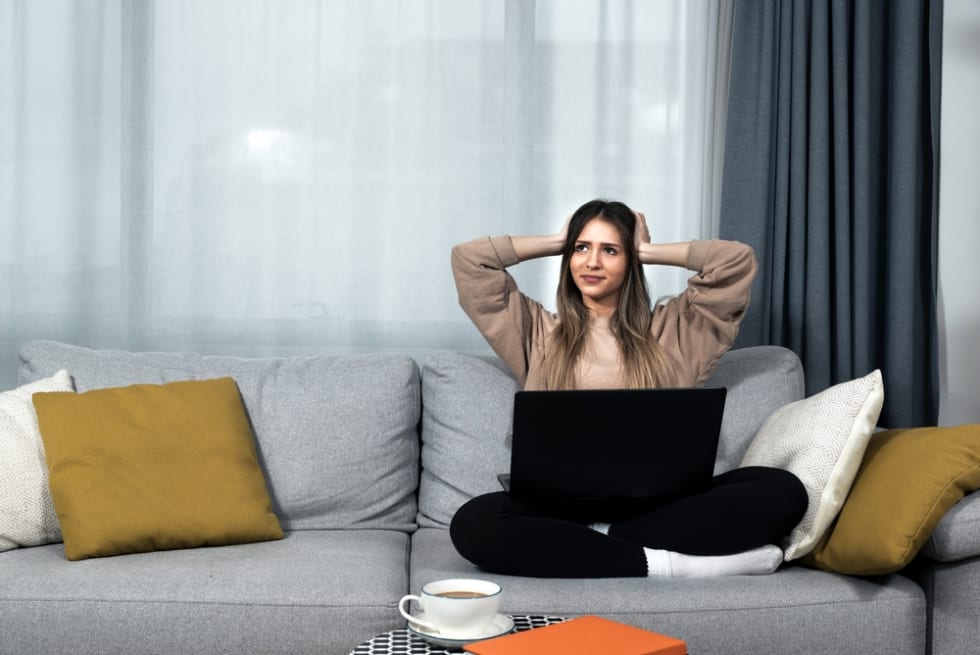
Your friends may swear by egg cartons and crates, but they don't do much to reduce noise. You may be able to absorb some of the sounds that carry. However, egg cartons are an eyesore and mostly a waste of your soundproofing efforts.
Have you ever wondered if foam panels really reduce noise? Well, soundproofing foam generally doesn't work, as sound tends to pass right through the porous textures.
A mattress might deaden the noise coming through the wall slightly, though it generally won’t work, and it doesn’t look very good.
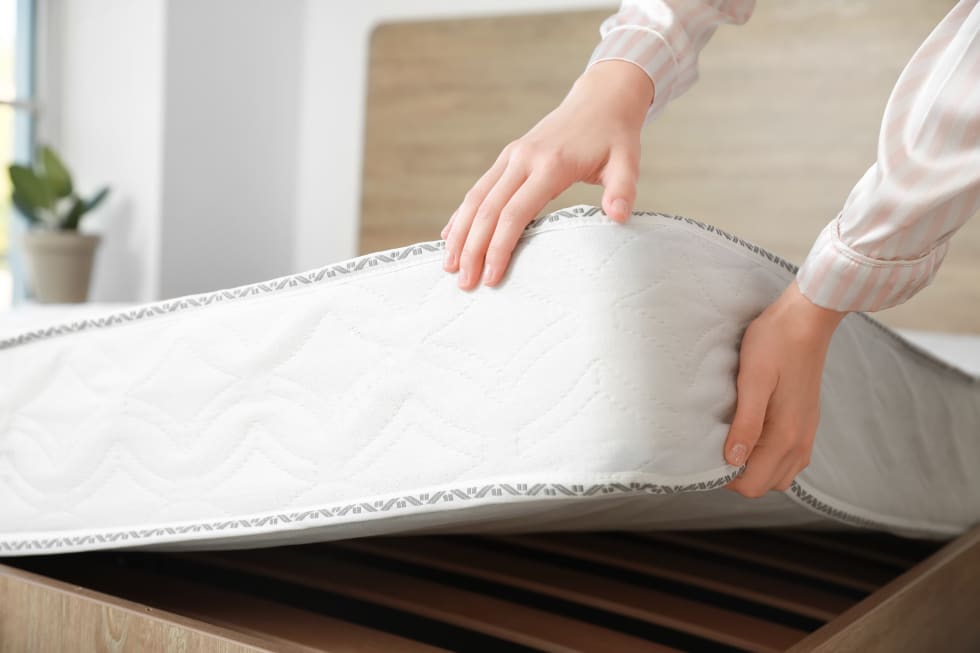
Do acoustic panels help soundproof? Acoustic panels for apartment walls can help reduce noise inside if your issue is sounds and echoes bouncing off your walls. However, they won’t do anything about the sound entering your apartment.
Soundproofing an apartment doesn’t have to involve expensive renovations or permanent changes. From rugs and bookshelves to MLV and window inserts, renters have plenty of damage-free solutions to reduce noise and make home feel more peaceful. By layering multiple strategies.
But if you've absolutely had it with noisy neighbors, you can always use our bonus tip: Find a new place! Take our easy quiz to get started finding a new place today!
There's little way to know what kind of insulation and soundproofing an apartment has except to ask the landlord or property management. Have a candid conversation and let them know you're sensitive to noise and would like to learn more about the quality of the construction before signing a lease.
You can soundproof a shared wall by adding bookshelves, white noise, and approaching your noisy neighbors with kindness.
Many older apartment buildings are more soundproof than the more modern builds. Because it is expensive to soundproof, it’s not common to find this feature in apartments today.
Typically, sound travels down in an apartment. This means that looking for an end unit or top floor unit can also reduce the chance of shared noise.
The best way to tell if an apartment has good soundproofing is to ask to see it during a weekend morning before the brunch crowd heads out on the town. You can also ask to see the apartment one evening after work or on a weekend evening.
Airborne noise is sound that travels through the air, like traffic, voices, or loud music. It’s best controlled by sealing gaps in doors and windows, adding mass with curtains or bookshelves, or using window inserts. Impact noise, on the other hand, is caused by vibrations traveling through a building’s structure, like footsteps, dropped objects, or furniture being moved. The most effective ways to reduce impact noise are rugs, padded underlayment, or carpeting.


In unit laundry, Hardwood floors, Dishwasher, 24hr maintenance, Stainless steel, Walk in closets + more
In unit laundry, Granite counters, Pet friendly, Stainless steel, Walk in closets, Gym + more